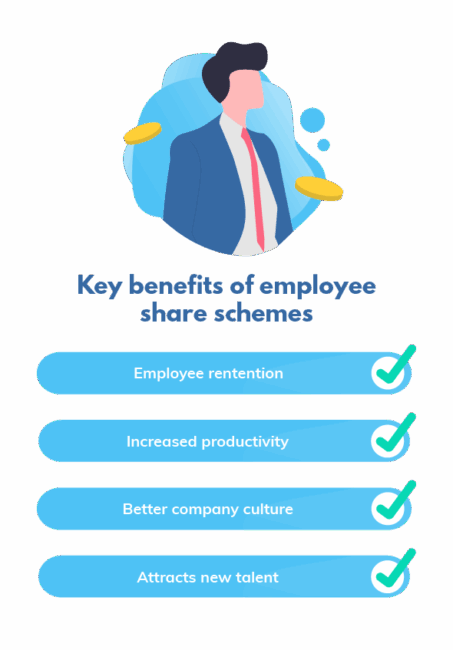

What Are Employment Related Securities Schemes?
Employee Related Securities (ERS) schemes are a way for limited companies to gift or award shares (securities) to employees and company directors. There are different types of schemes, and some of these offer tax advantages for those in them.
In this article we go over the different types of ERS schemes available, and what they might mean for reporting and paying tax.
What are Employment Related Securities?
Limited companies are owned by shareholders who, quite literally, hold a share in the business. These shares can be valuable because shareholders normally receive a share of the profits according to the number and type of shares they own – a payment known as a dividend.
Gifting shares, or ‘securities’, to employees (hence the name ‘Employment Related Securities’) means staff can be rewarded by the profits they create through their work.
As long as the company uses an approved scheme, those who participate might not even need to pay tax and National Insurance contributions on them. For employers this can be a very valuable benefit which helps them to attract the best talent.

Different types of Employment Related Securities schemes
Employment Related Securities (ERS) schemes are split into two broad categories: tax advantaged or non-tax advantaged.
As a company you might choose to grant shares through a non-tax advantaged scheme if you feel it’s more appropriate for your business. Employees will only pay tax on their shares when they choose to exercise their options (when they buy company shares as part of their compensation package).
In a tax advantaged scheme, it’s the employee receiving the shares who gets the advantage. For instance, they might not need to pay tax or National Insurance on the value of the share. Examples of tax advantaged Employment Related Securities (ERS) schemes include:
- Share Incentive Plans (SIP)
- Save as You Earn (SAYE)
- Company Share Option Plans (CSOP)
- Enterprise Management Incentives (EMIs)
Share Incentive Plans (SIPs)
If you receive shares through a Share Incentive Plan (or SIP), you won’t pay Income Tax or National Insurance on their value as long you keep your shares in the plan for a minimum of 5 years. You still have the option of taking them out of the SIP before then, but this will incur tax and National Insurance.
There are different ways of getting shares under a Share Incentive Plan.
| Free shares | An employer can grant up to £3,600 worth of shares in any one year – totally free. It can be a superb way to reward employees for continued loyalty. |
| Partnership shares | The employee can use their pre-tax salary to buy shares as you go along, up to a maximum of £1,800 or 10% of your income for the tax year (whichever one is lower). |
| Matching shares | This is where an employer matches any share purchases an employee makes with a free contribution. The employer can give an employee up to two free matching shares for each partnership share they buy. |
| Dividend shares | Buying shares in a profitable company means you’re likely to receive dividends. Rather than taking the payment though, you could use it to buy more shares in the scheme – increasing your holding in the process.
You only need to keep dividend shares for three years before they become totally tax-free, rather than the five years which is standard for other SIP shares. |
Save As You Earn (SAYE)
In a Save As You Earn scheme (also known as Sharesave), employees and directors can enter a 3- or 5-year savings contract to put aside up to £500 from their salary each month.
At the end of the contract, you can then use the money accumulated in your SAYE scheme savings pot to buy company shares at a fixed price (which can include a discount of up to 20%).
If the market value of the shares has fallen and is lower than the fixed price, you can simply choose to take your cash back instead, as well as any interest earned – tax free.
Although you won’t need to pay tax or National Insurance on the difference between the option price (the price you pay) and the market price, you might have to pay Capital Gains Tax if you sell the shares.
Another option is to transfer your shares to an ISA within 90 days of the scheme ending, or directly from the scheme into a pension. This means you won’t need to pay Capital Gains Tax unless the shares increase in value between the time you purchase them, and the day you transfer them.
Company Share Option Plans
Company Share Option Plans, or CSOPs, are a kind of saving scheme where you don’t make a monthly contribution. Instead, the company grants employees and full-time directors the option to buy up to £60,000 (the 2025/26 threshold) worth of shares at a fixed rate.
So, if you buy the shares and the market value rises – great! You won’t pay Income Tax or National Insurance on the difference between what you paid and what they’re worth, as long as you have them for at least 3 years.
You might have to pay Capital Gains Tax if you sell the shares, but don’t forget the annual exempt amount (the amount of gains you can make before you start paying Capital Gains Tax).
Enterprise Management Initiatives (EMIs)
Enterprise Management Incentives (EMIs) are a way for employers to reward employees with valuable options in a growing company. The company can grant an employee share options worth up to £250,000 in any 3-year period. The scheme isn’t available for every business though – only companies with assets of £30 million or less are able to offer EMIs.
The employee won’t need to pay any Income Tax or National Insurance as long as they buy the shares for at least the market value the shares had at the point they were given the option to buy.
EMIs are especially useful where a company is in growth mode but doesn’t have a lot of cash. The company can basically use the initiative as a way of ‘topping up’ a salary, giving employees the option of buying shares in a company which has potential for a lot of growth.
In that respect it can help businesses attract employees which they might not otherwise be able to afford at that time.
From an employee’s point of view, foregoing some of their monthly salary means they can participate in the growth of the business, whilst hopefully making more money later which isn’t subject to Income Tax or National Insurance.
How do I register an ERS scheme with HMRC?
Any workplace Employment Related Securities scheme will need to be registered with HMRC to take advantage of the tax benefits, even if it’s a one-off gift of shares.
Sign into your PAYE Online account and add the Employment Related Securities service to your company’s profile before registering each scheme. If you’re not already, you’ll need to enrol for PAYE first – it can take up to 5 days.
Is there a deadline to register an Employment Related Securities (ERS) scheme?
In most cases, the deadline to register a new Employment Related Securities (ERS) scheme is 6th July following the end of the tax year in which it was created. Enterprise Management Incentives (EMI) schemes are an exception though and must be registered within 92 days of being granted.
Submitting an Employment Related Securities return
You’ll need to file an Employment Related Securities return every year, for each ERS scheme active. Even if you aren’t actively transferring shares that year, you’ll still need to submit a ‘nil return’ if any schemes are live.
There are some notable exceptions where an ERS return isn’t required. For example, if you are the owner of a limited company and want to gift shares to someone with whom you have a domestic, family or personal relationship, you won’t need to complete an ERS return.
The ERS return form you use depends on what kind of scheme you need to report on, so make sure you download and complete the right one! Upload the completed form to the ERS Online service, using the Government Gateway user ID and password you used when you told HMRC about the scheme.
What happens if I decide to end an ERS scheme?
You’ll need to inform HMRC if you choose to end any Employee Related Securities scheme. You can do this by signing in with the Government Gateway user ID you set up the scheme with. You’ll also need to provide the end date of the ERS scheme you want to close.
What are Employee Benefit Trusts?
An Employee Benefit Trust (EBT) is a type of discretionary trust which employers can set up as a way to incentivise and motivate staff. The benefits held by the trust might include pensions, sick pay, shares, or something else. They’re sometimes used as a way for employers to make shares available to employees under an ERS.
How does an EBT work?
This partly depends on what sort of benefit the EBT provides to its beneficiaries. A classic example is an EBT which holds shares on behalf of its employees. The shares aren’t directly owned by the beneficiaries, but they are entitled to receive the benefits which the trust provides – such as dividend payments from the company’s profits.
Learn more about our online accounting services for businesses. Call 020 3355 4047 to chat to the team, and get an instant online quote.
Want to learn more?
Subscribe to our newsletter to get accounting tips like this right to your inbox

Read more posts...

What Type of Legal Structure Should I Choose When I Start a Business?
13th February 2026The structure you choose when you start a business affects how the business operates, the amount of tax you pay, how you…
Read More
Estate Planning for Family Investment Companies
12th February 2026If you want to pass your wealth and assets on to the next generation, a Family Investment Company (FIC) could be an…
Read More
Do Influencers Pay Tax?
11th February 2026The occupation of ‘influencer’ or ‘content creator‘ is more popular than ever, but there isn’t much information out there on how to…
Read MoreConfirm Transactions
The number of monthly transactions you have entered based on your turnover seem high. A transaction is one bookkeeping entry such as a sale, purchase, payment or receipt. Are you sure this is correct?
Please contact our sales team if you’re unsure
VAT Returns
It is unlikely you will need this service, unless you are voluntarily registered for VAT.
Are you sure this is correct?
Call us on 020 3355 4047 if you’re not sure.
MTD IT Quarterly Updates
Your final, end of year MTD Income Tax submission is included in your fee.
You can submit the quarterly updates yourself using Pandle, or alternative bookkeeping software (which we recommend).
However, if you would prefer us to submit these updates, there is an additional fee of £35.00 per month.
Call us on 020 3355 4047 if you’re not sure.
Bookkeeping
You will receive our bookkeeping software Pandle for free, as part of your package.
You can use this to complete your own bookkeeping, or we can provide a quote to complete your bookkeeping for you.
Please select and option below:
Call us on 020 3355 4047 if you’re not sure.

